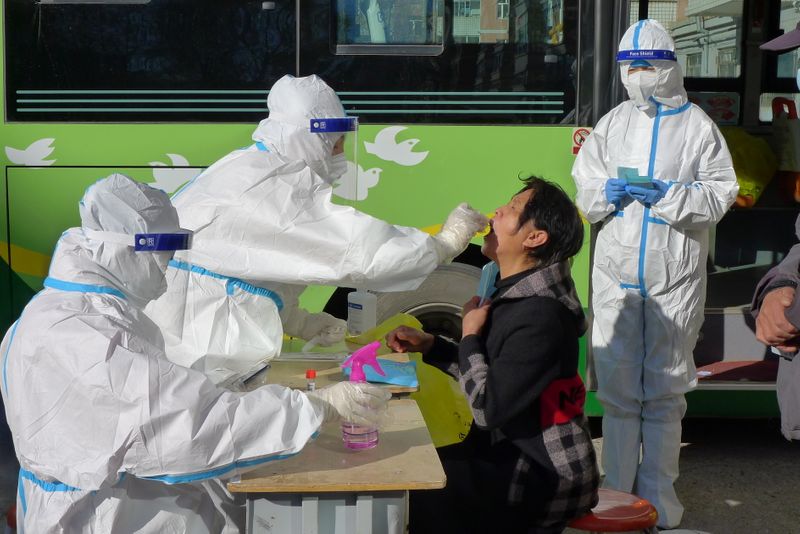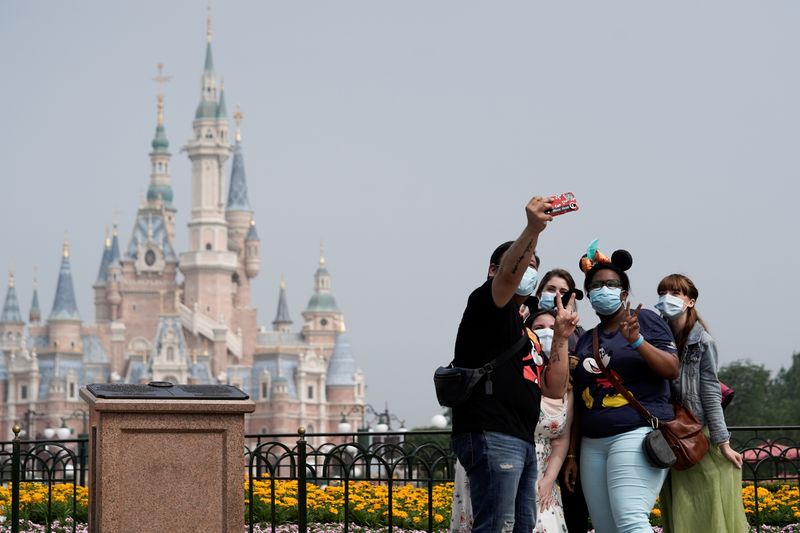BEIJING (Reuters) - China's leisure and tourism businesses are feeling the bite of the country's zero tolerance for COVID-19 as cities with infections, or have concerns about the virus, close entertainment venues, restrict tourism or delay cultural events.
Shanghai Disneyland stopped admitting visitors on Monday and Tuesday, and required patrons and staffers in the theme park on Oct. 30-31 to undergo COVID tests immediately, according to state media.
The measures are part of the city's cooperation with a COVID-19 investigation requested by authorities from outside Shanghai, state television reported, without providing further details.
A total of 484 domestically transmitted cases with confirmed symptoms were reported on Oct. 17-31, mostly in the north of China, Reuters calculations based on official data showed on Monday.
Many of the infections have been tourists who travelled across multiple regions, complicating and prolonging contact-tracing efforts.
While the caseload remains miniscule compared with clusters outside China, and the rise in local infections in some regions have started to slow or even stopped in recent days, China is sparing no effort in minimising transmission risks, even at the cost of disrupting businesses and local economies.
As China steps up vaccinations for children and rolls out booster shots, the impact from the current outbreak on economic growth in the fourth quarter will be smaller than in the third, said Nie Wen, a Shanghai-based economist at Hwabao Trust.
Gross domestic product in July-September grew at the slowest in a year, partly due to an outbreak over summer that affected over 40 cities including Nanjing and Yangzhou in Jiangsu province, which bore the brunt of the infections.
China's three biggest airlines on Friday posted deeper losses for July-September due to a domestic travel slump.
TOURISM HIT
Last month, the national tourism authority announced the suspension of travel agencies from organising inter-province trips that involve provincial regions with areas deemed to be at higher risk of the virus, and halted dedicated train services linking tourist attractions.
Many cities with local infections, including the capital Beijing, have halted some indoor leisure venues such as internet cafes, chess and card parlours, as well as cinemas, while a number of marathon races, concerts and theatrical performances have been delayed or cancelled.
Cultural and leisure businesses in some cities that have not detected local cases for a few months are also affected.
In northern Heilongjiang province, where the daily tally of new local infections topped Chinese regions since Oct. 29, Jiamusi city and Mudanjiang city on Oct. 30 announced temporary closure of various indoor entertainment venues.
Yichun, also in Heilongjiang, said tourists arriving from outside for leisure would be barred from entering tourist sites until Nov. 6. The three cities have reported no infections so far from the current outbreak.

In southern Dongguan city, also infection-free for now, an international exhibition centre suspended the hosting of various events.
Shares of China's consumption- and tourism-related companies were down in early trade on Monday. The consumer staples sub-index slipped 1.5%, while the tourism sub-index retreated by more than 4%.
